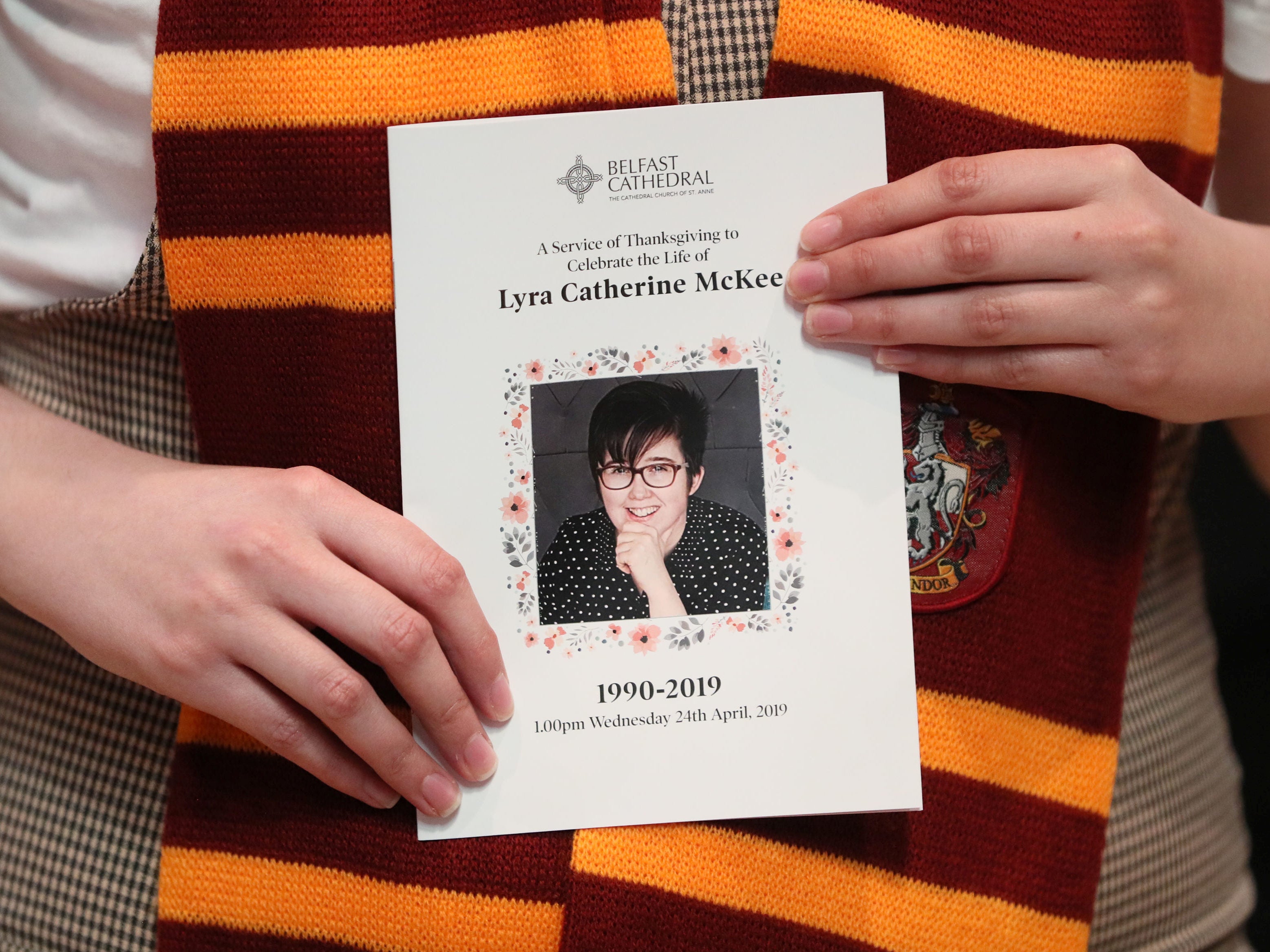
Lyra McKee was an “outstanding journalist” with an “insatiable curiosity”, the editor of a top-selling daily newspaper in Northern Ireland has said.
Belfast Telegraph editor Gail Walker, who worked often with McKee on freelance work, also said the murder of the 29-year-old felt like a “turning point” for the community in Northern Ireland.
Her comments came after McKee was shot dead while reporting on rioting in the Creggan area of Derry on Thursday night last week.
The New IRA has since admitted responsibility for the killing in a statement to the Irish Times and bizarrely apologised to her loved ones, claiming their intended target had been police, next to whom McKee was standing.
A 57-year-old woman who had been arrested in connection with the shooting yesterday has since been released unconditionally.
Lyra McKee’s funeral was held at St Anne’s Cathedral in Belfast at 1pm and was attended by Prime Minister Theresa May, Opposition leader Jeremy Corbyn and Irish Taoiseach (prime minister) Leo Varadkar.
Speaking to Press Gazette a day before the funeral, Walker said: “Lyra was an investigative journalist with an insatiable curiosity about anything that she was looking into. She could be quite obsessive about it.
“She was also somebody who was a real people person, which is so important because her interest in human beings and what motivated them and why they were the way they were was totally genuine and she had great empathy. She could get people to talk and open up to her.”
Walker added that McKee was a “beautiful writer” who could turn around “sparkling copy” in half-an-hour.
Addressing the safety of journalists in Northern Ireland, Walker said there was “a very real threat from republic dissidents” and there can be some “intimidating, scary and dangerous jobs” to be sent out on, adding: “Some of my journalists and photographers are out on those jobs.”
She went on: “Obviously for younger journalists, they probably have less experience of covering the Troubles or they don’t have any experience of covering the Troubles.
“So older journalists like myself who did cover the Troubles and got through, we can’t help but think: how unfair. Why should this have happened to Lyra in a time of relative peace?
She said Mckee had “joined a long list of people whose lives have been ended by gunmen who haven’t a fraction of the humanity that they’ve extinguished”.
But, Walker said it was “heartening” to see the local community sending a message to “the killers who prey upon them”.
Graffiti declaring “not in my name” was daubed on walls following Mckee’s death and dissident slogans painted over, it was reported. McKee’s friends put red paint handprints on the wall of dissident republican group Saoradh’s offices in Derry.
“Right now the dreadful tragedy of Lyra’s murder feels like it’s a turning point and it feels like things are changing,” Walker said.
“But there are some of us who have been journalists long enough to know there have been other events in the past which at the time felt like turning points or that we would never go back.
“The hope would have to be that this time this really is a turning point and to try to capture some of Lyra’s extraordinary spirit and the fact she had friends from all walks of life, from all sections of the community… I think it would be the most fitting tribute to her if this was indeed some sort of point of change.”
McKee’s funeral was also attended by Democratic Unionist Party leader Arlene Foster and Sinn Fein chief Mary Lou McDonald. The two leaders were pictured next to one another at the service.
Walker is one of many journalists in Northern Ireland who have paid tribute to McKee.
In a statement to Press Gazette, Irish News editor Noel Doran said: “The death of Lyra McKee was a tragedy of enormous proportions, and she will be sadly missed by her many friends both inside and outside journalism.
“Her funeral was an entirely unique occasion, during which her family found themselves mourning alongside a President and two Prime Ministers, and the proceedings reflected the impact she made during her all too short life.”
Writing for the Belfast News Letter, journalist Philip Bradfield described her as “always caring”, adding that she “unconditionally accepted others, even if their backgrounds or values were different, or even contrary, to her own”.
The young journalist featured in the Forbes 30 under 30 list in 2016 and had signed a two-book deal with publisher Faber and Faber. Her first book about the Troubles, The Lost Boys, is due for publication next year.
She wrote for a variety of publications, including the Belfast Telegraph, Buzzfeed and The Atlantic.
The Police Service of Northern Ireland said detectives “continue to appeal for help from the local community in Creggan or anyone with information” about her murder.
Picture: Brian Lawless/Pool via Reuters.
Email pged@pressgazette.co.uk to point out mistakes, provide story tips or send in a letter for publication on our "Letters Page" blog

